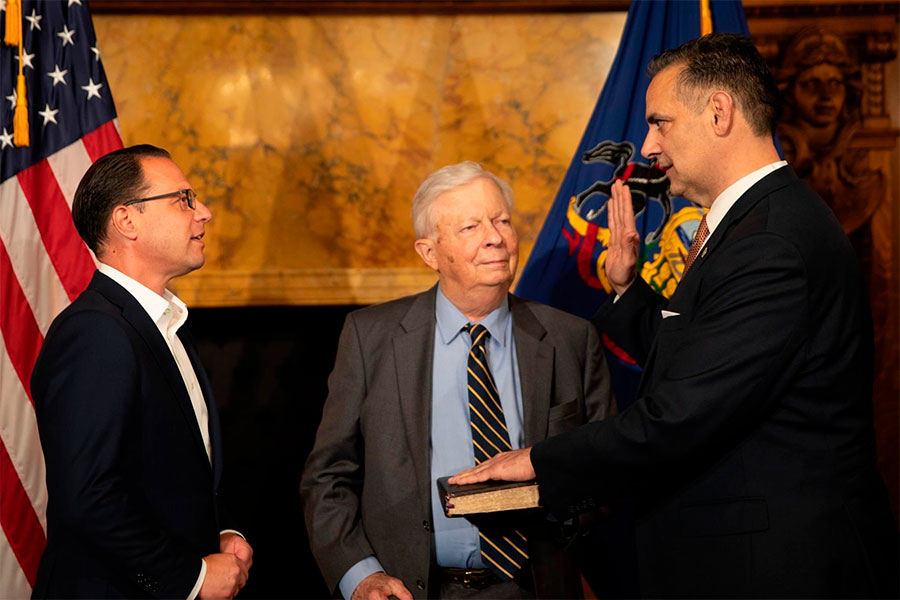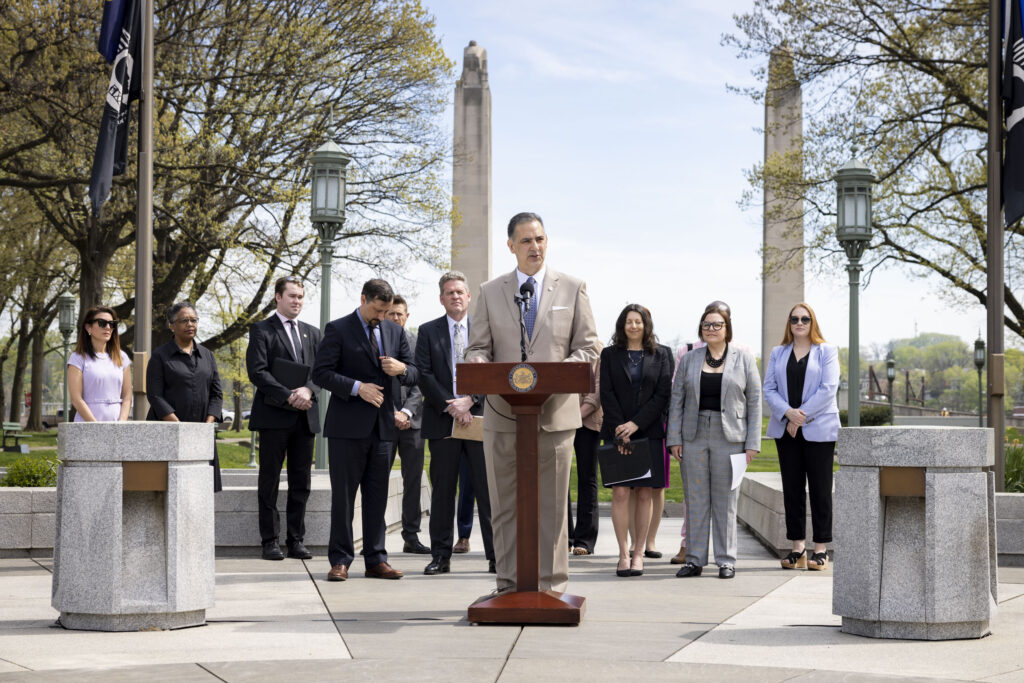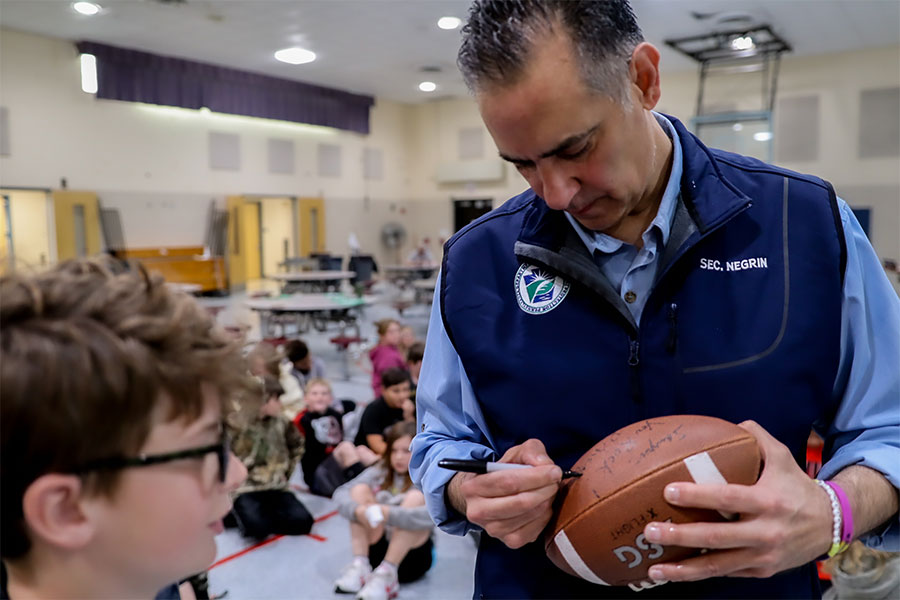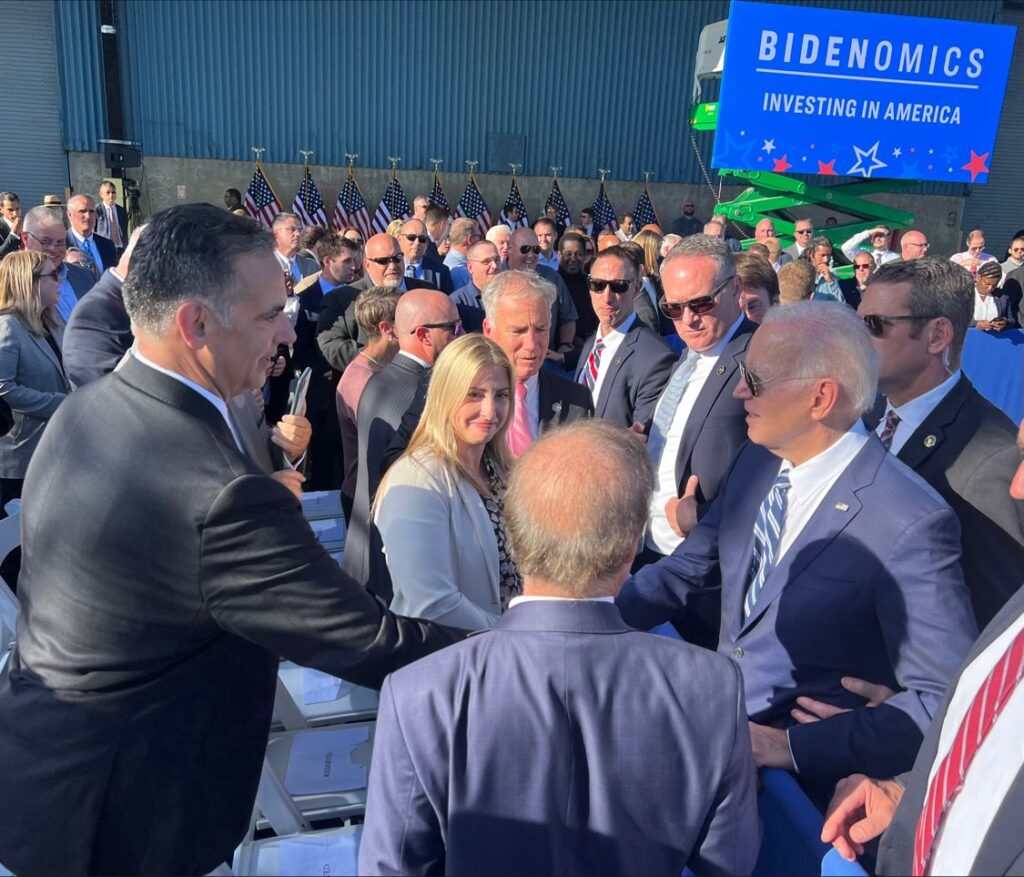IN PENNSYLVANIA A HEALTHY ENVIRONMENT IS A LEGAL RIGHT
Hispanic Heritage Month officially ends on October 15, and to conclude the series of special editions honoring Latinos from the region and the celebrations, Impacto spoke with the highest-ranking Latino in the State of Pennsylvania, being the only one who is part of the cabinet of Gov. Josh Shapiro, a nationally high-profile Democrat.
The Secretary of the Department of Environmental Protection ( DEP ), Richard Negrin, made his objective clear and how he intends to do it. It works to intervene proactively, with the goal of preventing further environmental crises from occurring.
The DEP vision has four pillars: Operational Excellence – Climate Leadership – Cultural Competence – Environmental Justice.
Rich is a well-known face in Philadelphia, he was vice mayor during the administration of Michael Nutter, standing out from other officials, and he left his mark on many of its inhabitants, especially among the most vulnerable.
That is why he enthusiastically accepted the new assignment. Fundamentally, Rich is a gladiator in defense of those who suffer and those who are discriminated against; he knows that identifying a common purpose and working as a team is the basis for success.
His outstanding achievements range from his past as an American football player, to the ones that are beginning to germinate, sowing hope in children and adolescents who are listening to him speak about their civil right to a healthy environment and the importance each of them has to defend it, thus calming the anxiety that the climate crisis, which is increasingly affecting local communities, could be causing them.

SOMETHING PERSONAL
The rate of Latinos with asthma is as disproportionate as it is alarming. According to the Pennsylvania Department of Health, “In 2019, approximately one in four Hispanics, one in five non-Hispanic Blacks, and one in seven non-Hispanic Whites reported lifetime asthma.” This is not coincidental.
Rich’s mother has dealt with this disease her entire life. “I grew up with a mother with asthma in a community where there was a lot of smoke in the air.” He says that his sister also had asthma and that he missed a year of school because of it.
“I grew up in an environmental justice community without knowing it as a child; I was born in Newark and grew up near the Port Elizabeth oil refinery. At the end of the street where I played football, about half a block away, was the largest oil refinery on the East Coast, and also a major eight-lane highway less than 100 yards from the back of my yard, a railroad, a junkyard two blocks away and a funeral home.”
He considers that the community is not fully aware that someone somewhere made decisions without involving those affected so that they could ensure that everything was done with equity and justice.
For Rich, Environmental Justice is something personal, which is why his wide and diverse experience is useful in fulfilling his objective. He wants this administration’s legacy to be to have effectively combated the climate crisis and the social injustice that lies at its origin.
He stresses that he is currently facing the legacy of bad policies. “There is lead in paint, pipes, and asbestos in our schools. Affluent communities could eliminate that 20 or 30 years ago when the Clean Air and Clean Water Acts were passed in 1972. Communities that had the means and ability started cleaning up, but our communities were left behind.”
INTERDISCIPLINARY EXPERIENCES WITH DIFFERENT APPROACHES
As a young lawyer at Morgan Lewis, he represented clients on environmental and regulatory issues.
“My job was to keep my clients out of trouble… I represented clean energy companies… that was where my education about the environment began. And then, when I was City Manager, people pointed out a lot of the great things we did around public safety and quality of life, and all of that matters, but we also ran the Greenworks program and planted more trees in Philadelphia than any administration before ours. “I was the first city manager to install an electric charging station in our fleet department.” At the time, Mayor Nutter was on President Obama’s environmental committee.
Rich is aware that mobilizing communities is essential to combat climate change, but he knows how difficult it is since “when you are worried about putting food on the table, clothing your children, and making sure they walk to school safely, you don’t necessarily think about air quality.” He emphasizes that they cannot afford to move. There is no social safety net to say: “I am going to take my family to a better environment because where you live should not determine the quality of life around you.” That is why we have to intervene massively from all levels, especially from officials.

PENNSYLVANIA AT THE FOREFRONT
Pennsylvania is one of the three states in the American Union that has elevated the protection of natural resources to one of its civil rights.
The amendment of Article One, Section 27, made it a constitutional right. “We did it in 1971, 50 years ago. “Montana did it a couple of years after us; New York did it about three years ago.”
That policy update had green amendments on March 27, 2023. More states continue their efforts to make a healthy environment a legal right. Pennsylvania is in the leadership of this crusade of *Green Amendments to the defense of the environment based on environmental justice.
In the U.S., millions of people lack access to clean water, and nearly everyone around the world is regularly exposed to unhealthy levels of air pollution. By establishing a healthy environment as a basic civil right, government authorities are pressured to protect environmental health.
Former State Senator Franklin Kury was responsible for drafting the 1971 constitutional amendment, which added Section 27 of Article 1 to the Pennsylvania State Constitution. In particular, the constitutional amendment outlined the rights granted to citizens of the Commonwealth with respect to the state’s natural resources, as well as the Commonwealth’s responsibility to keep them uncontaminated.
Art 1, 27. Natural resources and public goods. The people have the right to clean air, pure water, and the preservation of the environment’s natural, scenic, historical, and aesthetic values. Pennsylvania’s public natural resources are the common property of all people, including generations to come. As custodian of these resources, the Commonwealth will conserve and maintain them for the benefit of all the people. (May 18, 1971, PL769, JR3)
Expand the definition of Environmental Justice and make it not only urban
What makes Pennsylvania unique is its rich energy heritage. Titusville is the first place where an oil well was drilled, along with gas extraction, making Pennsylvania pioneers in this industry. But communities were built on top of abandoned oil wells across the state. “Those are environmental justice communities too.”

REGIONAL LEADERSHIP
In 2021, the Sixth Report of the Intergovernmental Panel on Climate Change (IPCC) warned that in less than two decades, the temperature will increase by 1.5 °C, but that if greenhouse gas (GHG) emissions are not reduced, the temperature could rise by up to 4.5 °C by the year 2100.
The latest IPCC report reminds us that the environmental crisis is global, but the effects are local.
One of the main actions to address this problem, which affects poor countries more, even though the rich ones pollute more, is public awareness to take action and get governments and private initiatives to do so as well.
Rich is leading the region in a conversation with all Mid-Atlantic secretaries. “Maryland, Delaware, Virginia, West Virginia and Pennsylvania, we were all together for two days working with the EPA and Region Three, talking about our strategies.”
Regarding the historically poor air quality a few months ago, he says, “There were no Democrats or Republicans when we were in a purple air quality alert. We were all just trying to be healthy and safe.”
However, not everyone is affected by these crises in the same way, as there are those who are extremely disadvantaged. “It’s about life expectancy… you can see it right here in Philadelphia, but across Pennsylvania, there is a 20- to 25-year life expectancy gap.”
Rich gives the example of the Society Hill area, a couple of miles north of Philadelphia, where people live to be 80 years old, but in the north, where mostly black and brown people live, the expectation reaches the most vulnerable population of 60 years old. “That’s not justice,” he objects.
“The difference is access to good health care… there are quality of life and public safety issues in poor communities… the environment is part of it.”
“It is about the inherited environmental problems that we have generated due to the society we have created and the socioeconomic problems we have. It is the opposite of the red line; when they created that red line and said:
‘We’re going to give you a mortgage, and you can live in this neighborhood, but you can’t live in that affluent one… you need to live in the underserved one, and we’re going to put all the bad things in that one.’”
Pennsylvania participates in the Climate Pollution Reduction Grant program, which is part of the federal Inflation Reduction Act (IRA). The program provides grants to state and local government entities to develop climate action plans and makes them eligible to receive grants from the $4.6 billion pool established by the IRA and administered by the EPA.
INTERCONNECTED INTENTIONALITY
The Infrastructure Jobs Act, the Inflation Reduction Act, and the climate bills addressing their improvement are important federal targets for billions of dollars of investment.
Rich says President Biden and Governor Shapiro understand this very well. Adam Ortiz is the regional administrator of the EPA; for the first time, he is a Latino. “He and I work very well together; we are aligned in what we are doing… when they first make these big federal bills where literally hundreds of millions of dollars are sent to states and local communities, they are thinking about environmental justice. 40% of the spending will go to environmental justice communities. And they’re also thinking about something else that’s so important to Josh: workforce development.”
Rich highlights that it is usually left to local people and lower-level people, but now they want to create avenues for workforce development and training programs.
“I have never had a situation where they throw money at me. It has always been the opposite. I have hundreds of millions of dollars, and I can plan how to program them, how to spend them, how to give them back to our communities, and how to work with our local partners to make sure we are impacting everyone… we are going to be able to do that and put people to work.”

TRANSIT TO A CLEAN ENERGY ECONOMY
This is a transition to a clean energy economy where you can learn how to build solar and cover wells in Pennsylvania. “You can learn how to get the lead pipes that are there out of the ground. We can build an infrastructure around a major jobs program around all of that… During the Obama years, during the Great Recovery Act, it used to be about being “Shovel ready”; now, we need to be “people ready!”
When he worked in the government in Philadelphia, Rich remembered what a heat wave meant. “We knew that every time we had a record hot day, we were going to lose people, people were going to die, people who were living in poverty, people locked up, people who were alone.”
Last August was the hottest month on record in Pennsylvania. The second warmest month was July, and the third warmest month was June. We had three of the hottest months in Pennsylvania history, and it’s going to happen more and more. We’re seeing extreme weather, with drought warnings for about three months, and then we get about three months of rain in a couple of days, causing flash and catastrophic flooding.
The drought causes the forest fires that are seen everywhere. According to the official, wildfires in Pennsylvania have tripled this year. He adds that COVID showed that the climate crisis will affect vulnerable populations the most. “They can’t move, they don’t have air conditioning, they will be subjected to the heat in a way that others are not.”
HISPANIC HERITAGE MONTH SPOTLIGHTS WOMEN
Carolina DiGiorgio is the current attorney for the Department. “We incorporated her into the board of directors of Congreso when she was a young lawyer. She has experience in the community and is doing a great job. She is the first Latina with that position.”
Recently, Rich mentions that, in front of lawyers at the Hispanic Bar Association, he paused to talk about the environment, “I talked about climate change, about environmental justice… but I said, I want to talk a little bit about our Latinas because we are not where we need to be in equal pay. That’s one of the things I did when we came in the first month, review our salaries and make sure they were aligned; from an equity perspective, we all need to do that, especially law firms.”
Due to the wage gap, Latinas with a professional degree will earn $2.5 million less throughout their career.
Within his team, he highlights that he has Latinos of diverse origins working. A Cuban, a Nicaraguan, a Mexican, Honduras, Dominican Republic; “Many of us have faced the same challenges or the same situation, so we are making real progress.”
Under Rich’s administration, Fernando Treviño is leading a new undersecretary of Environmental Justice, focused on one of the priorities of the Federal and State Administration.
Secretary Negrin recognizes several positive actions for Latinos by the Government of Pennsylvania. The Shapiro administration has made three main actions that have benefited Hispanics:
– A historic budget for education of 10 billion dollars.
– 10,000 jobs are expected to be created that will also benefit Philadelphia.
– Investment of $36 million in small businesses and minority ventures.
Regarding immigrants, he points out that: “You want people to come and do the right thing. You want them to play by the rules. You want them to come out of the shadows. Let’s they’re legitimate enough for you to hire to pick your food and work your yard. It should be legitimate enough to drive with a legal driver’s license”.
STOP CLIMATE DEATHS
Last summer, children in the Philadelphia suburbs were torn from their parents’ hands by flash floods. “Those are climate deaths here in Pennsylvania.” He said.
“I want to make people aware of their rights and create an army of climate warriors who think about the climate every day, who make good decisions every day so that we transition, not only to electric vehicles but that we are in transition to a clean energy economy. I want young people who grow up and are enthusiastic about working for the environment. I think when I talk to them, they understand it, and they want to make a difference. There is no issue more important than the weather right now. We are the first generation to feel the significant impacts of climate change.”
He emphasizes that there is no time to waste and that equipping young people with a purpose in life will make it easier to take weapons out of their hands.
Rich is building a green army and calls on everyone, especially young people, to be part of the generation that changed the course of history.

«Many years ago, Philadelphia hosted the dawn of a new democracy. Today, a new era of a clean energy future was announced here in Philadelphia. Proud to stand with @POTUS President Biden & @GovernorShapiro to announce the new Hydrogen Hub in PA. The world is watching, and the future of clean energy starts right here in PA. A near 50 billion investment in clean hydrogen infrastructure, a well-trained and skilled workforce, and a better clean energy future. Congrats to Philly Project Lead Manny Citron it was great putting the band back together. So honored to play our small role. So proud of you. #TeamDEP is ready to go!» Rich Negrin/Linkedin.
* A Green Amendment is an amendment to a state constitution’s bill of rights that guarantees its citizens the inalienable right to clean air, clean water, and a healthy environment.
Translation Gabriella Paez







